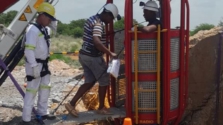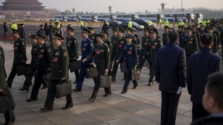Osamu Suzuki, a Suzuki Motor Corporation egykori elnök-vezérigazgatója, 94 éves…
Politika
Merénylet Kísérlet a Japán Miniszterelnök ellen: 10 Év Börtön a Tettesnek
Egy japán bíróság tíz év börtönbüntetésre ítélt egy 25 éves…
Afrika geopolitikai kihívásai és lehetőségei: W. Gyude Moore és Baranyi Tamás kerekasztal-beszélgetése
W. Gyude Moore, Libéria volt közmunkaügyi minisztere a Magyar Külügyi…
Nagyhatalmi Érdekek Ütközőzónája
Afrika a világpolitika egyik legnagyobb ütközőzónájává vált, ahol a helyi…
75 years of Viet Nam-Hungary relations: From the slogan “We are with you, Viet Nam” to a constantly growing Comprehensive Partnership
Viet Nam – Hungary: Outstanding milestones over the past 75…
Tömegsírokon át – Ruanda nem felejt
Ha meghal valaki, a család gyászol. Sírás, kesergés, önvád. Megfogalmazódik…
Bulvár
Új dalával robbantott L.L. Junior és Azahriah – pletykák és találgatások a „Zha maj dur” mögött
Pár napja jelent meg L.L. Junior és Azahriah új dala,…
Merénylet Kísérlet a Japán Miniszterelnök ellen: 10 Év Börtön a Tettesnek
Egy japán bíróság tíz év börtönbüntetésre ítélt egy 25 éves…
Tragédia Dél-Afrikában: 78 bányász holttestét találták meg egy aranybányában
A dél-afrikai rendőrség a múlt héten emelte ki 78 illegális…
Aranyérmet Kapott a CineFest Miskolc Nemzetközi Filmfesztivál Igazgatója
Bíró Tibor, a CineFest Miskolc Nemzetközi Filmfesztivál igazgatója, a Magyar…
Pokorny Lia szilveszteri szerencséje
Szilveszter napján különleges esemény történt Szerencsen, amikor Pokorny Lia, a…
Elhunyt Tamás Gyula, a magyar labdarúgás ikonikus kapusa
Mély szomorúsággal értesültünk arról, hogy 83 éves korában elhunyt Tamás…
Életmód
Dubaji ingatlanpiac: özönlenek a dollármilliomosok Hogyan fektessünk be biztonságosan a világ leggyorsabban növekvő térségében?
A dubaji ingatlanpiac napjainkban az egyik legdinamikusabban fejlődő befektetési célpont.…
Látássérült embereken segít egy kínai robot
A hatlábú kínai robot egy izgalmas fejlesztés, amely a látássérült…
Kína, Irán és Oroszország közös hadgyakorlata: A tengeri együttműködés erősítése
Márciusban közös hadgyakorlatot tart Kína, Irán és Oroszország haditengerészete az…
Kína áttörést ért el a Pejpu-öbölben: Új olaj- és gázmező felfedezése
Kína legnagyobb olajipari vállalata, a CNOOC, jelentős áttörést ért el…
Dubai új forgalomirányító rendszert vezet be a dugók csökkentése érdekében
A Dubai-i Közlekedési Hatóság (RTA) bejelentette, hogy egy új, mesterséges…
Kína gazdasága előtt álló kihívások és lehetőségek
Hszi Csin-ping kínai elnök egy szombaton megjelenő cikkében kijelenti, hogy…
Gazdaság
Dubaji ingatlanpiac: özönlenek a dollármilliomosok Hogyan fektessünk be biztonságosan a világ leggyorsabban növekvő térségében?
A dubaji ingatlanpiac napjainkban az egyik legdinamikusabban fejlődő befektetési célpont.…
Elhunyt Osamu Suzuki, a „mi autónk” megalkotója
Osamu Suzuki, a Suzuki Motor Corporation egykori elnök-vezérigazgatója, 94 éves…
Kína áttörést ért el a Pejpu-öbölben: Új olaj- és gázmező felfedezése
Kína legnagyobb olajipari vállalata, a CNOOC, jelentős áttörést ért el…
Kultúra
Dubai Oktatási Reformja: Kötelező Nyelvoktatás Már A Bölcsődében!
Dubai ismét egy jelentős döntést hozott az oktatás területén, amely…
Japán Tradíciók: Ősi Bölcsességek a Modern Világban
A japán kultúrában továbbra is nagy tisztelet övezi az ősi…
Hasznos tippek Dubajba utazóknak
Dubaj az utóbbi években egyre népszerűbb úti céllá vált, és…
A világ itthon
HERCZEG ZOLTÁNT EGY ÉV FELFÜGGESZTETT BÖRTÖNBÜNTETÉSRE ÍTÉLTÉK.
A Budapesti IV. kerületi bíróság felfüggesztett börtönbüntetést szabott ki az…
Milyen jogok illetik meg az embert a pszichiátrián?
Kevés kiszolgáltatottabb helyzet létezik manapság, mint amikor valaki bekerül egy…
Jeszenszky Géza támadóját ugyanaz hajthatta, mint a hamburgi késelőt
A 70 éves G. Ferenc, aki kalapáccsal támadt rá Jeszenszky…


























